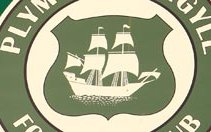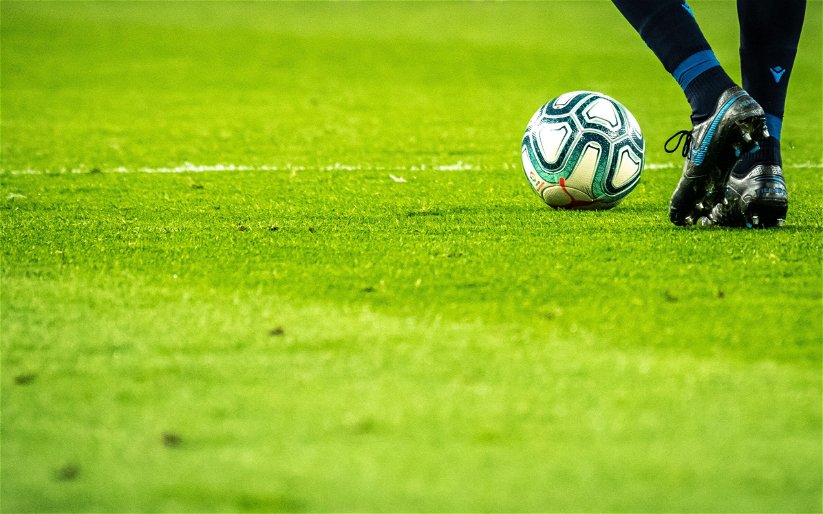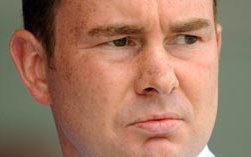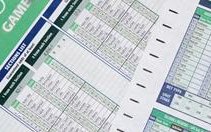This installment in the Where Are They Now series puts the spotlight on the career of classy striker Steve Crawford.
STEVIE CRAWFORD – Born 9th January 1974 Dunfermline, Scotland.
Stevie spent far less time at Argyle than any other player I have featured in this series , but the quality of the goals while he was here, and what happened to him after he left is what the Where are They now features is all about.
Stevie began his football career playing for Rosyth Rec when he was seventeen. He was only with them a season when he was signed by his first professional club, Raith Rovers on 13th August 1992.
His arrival at Raith coincided with one of the best periods in the clubs history. In his first season they won the Division 1 title. On 27th November 1994 Raith played Scottish giants Celtic in the Scottish League Cup Final, Stevie opened the scoring for the underdogs before Celtic scored twice, a late Raith equaliser took the game to a penalty shoot-out with Raith winning 6-5 to beat the hot favourites.
As a result of winning the cup they qualified for the following season`s UEFA Cup, after getting through the first two rounds they were drawn against Bayern Munich, with their small ground not able to get all the fans in who wanted to see the game, the match was played at Easter Road home of Hibernian, the Germans won the first leg 2-1. In the second leg Raith surprisingly took a 1-0 lead before final losing 2-1 with Bayern going on to win the cup.
Stevie’s goalscoring had brought him to the attention of English clubs and after making 125 appearances and scoring 24 goals he moved to Millwall.
Stevie was an almost ever present for his new club during the 1995-96 season, playing in 42 league and two cup games scoring eleven goals. It was these goals that persuaded Hibernian to make a bid of £360,000 to take him back to Scotland after only one season in England.
Stevie had an eventful time at the club, in his first season they were relegated from the Scottish Premier League and in his second they were promoted back to it. Despite making 82 appearances and scoring 24 goals on 29th October 1999 he was loaned out to his home town club Dunfermline for the rest of the season.
It was a successful season for both Dunfermline and Stevie, he scored sixteen goals in 25 appearances and was voted the Scottish First Division Player of the Year.
Surprisingly was allowed to join Dunfermline permanently on a free transfer on 9th May 2000.
He scored his first goal of the 2000-01 season on 12th August against St.Johnstone and added another eight to that one to finish the season as leading goalscorer.
The following season he was just as prolific, scoring his final goal of the season in a 1-1 draw with Rangers helping his team to finish sixth.
The 2002-03 season again saw Stevie finish as leading goalscorer with 19 goals from 35 games including a hat trick against Dundee which helped Dunfermline finish one place higher than the previous season in fifth. The following season was his club’s most successful for many years with Stevie’s thirteen goals helping them to finish fourth and qualify for the next seasons UEFA Cup.
He also helped Dunfermline reach the Scottish Cup Final against Celtic, despite taking a 1-0 lead they were eventually beaten 3-1. After making a total of 194 appearances and scoring 73 goals with his contract up Stevie decided he would like to have another go at playing in England.
When new Argyle manager Bobby Williamson heard he wanted to move he offered him the chance of joining the club who had just been promoted to the newly named Championship.
Stevie made his debut on 7th August 2004 in a 0-0 draw at home to Millwall in a game watched by a crowd of 16,063. He scored his first goal in the next home game, a 2-1 win over Sunderland who had been relegated from the Premiership and would finish the season as champions. After Paul Wotton had given Argyle the lead with a superbly taken free kick from way out to the left of the penalty area in front of the Devonport End. Stevie doubled the lead with a well taken goal beating two or three Sunderland players before lashing the ball into the net. Despite a late Sunderland fight back Argyle held on for their third win in the first four games.
Stevie’s next goal came three days later in a League Cup game at Yeovil and was probably the most bizarre ever scored by an Argyle player. Lee Johnson, the son of Yeovil’s manager Gary, had attempted to sportingly pass the ball back to Luke McCormick in the Argyle goal after the ball had been put out of play, he over hit it and the ball sailed over Luke into the net. The Green Army and players were obviously incensed as the ref awarded a goal. As the teams lined up for the restart Gary Johnson called his captain over and told him to let Argyle score from the kick off.
Stevie got the ball and walked the ball past the motionless Yeovil players to roll the ball into the net to even the goal up. Unfortunately after the game ended 2-2 with Paul Wotton scoring a penalty, Argyle were beaten 3-2 with a goal in extra time, Lee Johnson scored all of the Yeovil goals.
A month later Stevie scored in a 3-2 defeat at Ipswich with Steve Adams getting the first Argyle goal. His next came in another defeat, 2-1 at home to Wigan. Stevie got the second goal on a cold November Tuesday evening in a 2-2 draw at home to Reading, a Steve Sidwell own goal had opened the scoring and Stevie’s goal before half time looked to have the game sewn up. Not long into the second half Mickey Evans had a one on one with the Reading goalie but couldn’t manage to score the third goal.
Argyle were made to pay for the miss with the visitors scoring two late goals to take a point.
On the following Saturday Argyle made up for the disappointment when they went to Wigan and beat the runners-up 2-0 with Paul Wotton and Stevie both scoring to get revenge for the home defeat three weeks earlier.
By now Stevie had made it known he was missing his family who hadn’t made the move to Plymouth with him and despite being happy at the club wanted to move back to Scotland. He played his last game for the club on 28th December 2004 in a 2-1 defeat at Leeds watch by a crowd of 34,496. Stevie came off the bench to score the Argyle goal, I can’t remember why now but there was some controversy about the Leeds winner.
After only 27 games and scoring seven goals, almost every one of them memorable, on 4th January he left to join Dundee United for a fee of £80,000.
Stevie spent the remainder of the 2004-05 season with Dundee, staying only long enough to appear in another Scottish Cup Final, unfortunately they were beaten 1-0 by Celtic. After 28 appearances where he scored five goals he moved to Aberdeen.
Once again Stevie failed to settle at his new club, despite being a first team regular at Pittodrie, he only stayed with Aberdeen for one season, making 39 appearances and scoring ten goals. On 30th August 2006 Stevie once again returned to the city he was born in to re-join Dunfermline on a two year contract.
His time as Dunfermline wasn’t as successful as his previous time there, in the two years he spent at the club he only managed to score eight goals from 67 appearances. At the end of his contract he was told it wouldn’t be extended and he was free to look for another club.
In July 2008 it was rumoured Stevie had been offered a move back to England with an un-named Championship club, given his previous homesickness he decided not to take up the offer.
On 1st July 2008 he joined Scottish second division team East Fife. On 14th April 2009 the East Fife manager David Baikie resigned, with Stevie initially taking over as caretaker player manager before the job became permanent a month later. After a season in charge he resigned but continued at the club as a registered player.
After making 54 appearances and scoring ten goals he left East Fife on 31st January 2011 to join Cowdenbeath.
After spending the second half of the 2010-11 season at Cowdenbeath making twenty appearances scoring two goals he moved on yet again to join Forfar.
His time at Forfar was short lived even by Stevie’s standards, he joined them on 1st July and after only seven appearances scoring three goals he left on 27th August to join Brechin.
His time at Brechin is hardly worth mentioning, after only fourteen days and playing one game he returned to Forfar. Where he made a further seven appearances for them.
In October 2011 he was offered the role of assistant manager at Falkirk. He remained with them until May 2014 when he joined Hearts also as assistant manager, given his connections with their Edinburgh rivals Hibernian he wasn’t a popular choice with all of the fans. Even at forty he has retained his registration as a player but I suspect those days are behind him now and he will concentrate on using his skills in football management.
As well as a successful club player Stevie also had a very good International career. He represented Scotland nineteen times at Under-21 level between 1994 and 1996 before appearing in two Scotland ‘B’ matches in 1998.
He also won twenty five full caps for his country, scoring four goals, including one on his debut on 24th May 1995 in a Kirin Cup game against Ecuador with Scotland winning 2-1.
In 2002 he scored twice in a 3-1 over Canada, despite both Carlo Corrazzin and Jason Bent being on the international scene then neither played in the game. His last goal for Scotland came in a 1-1 draw with New Zealand in 2003.
plymouthvital@aol.co.uk
Share this article



